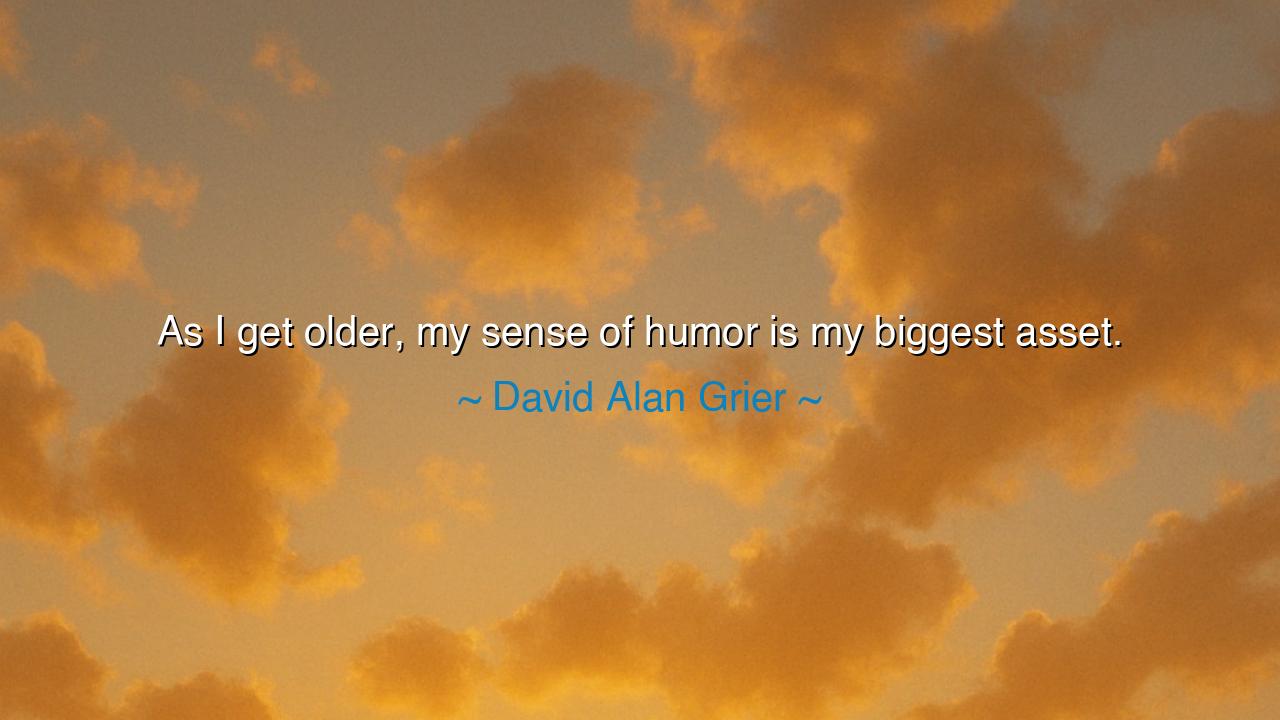
As I get older, my sense of humor is my biggest asset.






In the words of David Alan Grier, “As I get older, my sense of humor is my biggest asset.”
At first glance, these words shimmer with lightness, yet beneath them lies a deep river of truth — one that speaks to the essence of endurance, wisdom, and the art of living well. For humor, to Grier and to all who understand its sacred power, is not mere amusement. It is a form of grace, a shield against bitterness, and a mirror that reflects both pain and joy with equal clarity. As youth fades and the body bends beneath the weight of time, laughter remains the one treasure that cannot wither. In claiming his humor as his “biggest asset,” Grier reveals that what the world calls comedy, the wise recognize as wisdom.
To grow older is to encounter the steady erosion of illusion — strength gives way to frailty, certainty gives way to doubt, and the world that once seemed boundless becomes a circle of memory. Many resist this passage with sorrow or denial. Yet Grier’s words invite us to another path — one lit by humor, which transforms the aches of aging into music rather than lament. The ancients, too, spoke of this power. The philosopher Democritus, known as “the laughing philosopher,” taught that laughter was not a sign of madness, but of enlightenment — for to laugh at life’s folly is to rise above it. To see one’s own aging not as tragedy, but as comedy, is to claim freedom from fear itself.
The origin of this wisdom is found in every culture that has learned to face mortality with grace. The warriors of old, when their swords grew dull and their hair turned gray, would gather by the fire and tell stories — not of battles won, but of blunders survived. Their laughter was not mockery; it was acceptance. It said, “We lived, we stumbled, and still we rise.” In the same way, David Alan Grier, a man whose life has been steeped in the art of laughter, speaks not merely as a performer, but as a sage. His words carry the echo of those fireside tales — that humor, born from humility, is the surest sign of wisdom.
Consider the story of Mark Twain, who, in the twilight of his life, endured loss, debt, and despair. Yet his wit did not dim — it deepened. He once wrote, “Against the assault of laughter, nothing can stand.” He understood, as Grier does, that humor is not escapism, but resistance — a weapon against bitterness, a balm for the weary spirit. Twain’s laughter came not from ignorance of sorrow, but from mastery over it. So, too, does Grier’s declaration remind us that humor is not the absence of suffering, but the transformation of it — the soul’s alchemy turning pain into gold.
To call humor one’s “biggest asset” is also to acknowledge its power as currency — not of wealth, but of connection. With humor, one buys no luxury but earns the affection and warmth of others. A man who can laugh at himself invites compassion rather than pity, fellowship rather than isolation. The wise know that joy shared multiplies, while sorrow hoarded festers. The elder who laughs does not deny his mortality; he transcends it, teaching others that life’s end is not its enemy, but its fulfillment.
There is a profound humility in Grier’s words. As one ages, the illusions of mastery fall away — strength, beauty, ambition all fade — yet humor endures, precisely because it belongs not to the body but to the spirit. The ancients called this virtue eutrapelia — the noble playfulness that allows one to remain light in the face of gravity. It is the mark of the wise to meet adversity not with rage, but with a smile that says, “I understand.” For laughter, when true, is not denial but enlightenment — the acceptance that life is fleeting, absurd, and, therefore, precious.
Let this, then, be the lesson: cultivate humor as your greatest strength, for it will outlast every other. When youth fades, let laughter keep your spirit young. When sorrow comes, let humor soften its edge. When fear whispers that time is running out, let laughter answer that time itself is a jest — and that to live well is to laugh often, to love deeply, and to forgive swiftly. Practice daily the art of smiling at yourself; it is the most profound act of wisdom.
And so, dear listener, remember David Alan Grier’s words: “As I get older, my sense of humor is my biggest asset.” Let them guide you as the years unfold. Cherish humor not as distraction, but as a sacred inheritance — the proof that even as the body grows frail, the soul can still dance. For those who can laugh at life never truly grow old. In laughter lies the eternal — a melody that sings long after the voice is gone.






AAdministratorAdministrator
Welcome, honored guests. Please leave a comment, we will respond soon